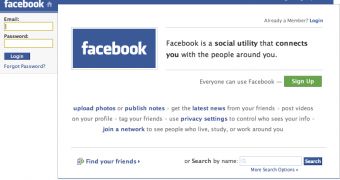A few days ago, the Facebook executives, a top web-based social networking service, announced that their product will make the profiles of the registered users public and accessible to anyone. Until now, you were able to view somebody's information only if you were registered for the service. But what's more interesting is that you can now view the details of a Facebook user without an account, a move that led to an avalanche of privacy concerns on the Internet. However, the Facebook officials defend themselves by limiting the amount of information accessible from a non-Facebook user, giving you the possibility to choose the details which will be published.
"Starting today, we are making limited public search listings available to people who are not logged in to Facebook. We're expanding search so that people can see which of their friends are on Facebook more easily," Philip Fung wrote on the official blog of the social networking website.
"The public search listing contains less information than someone could find right after signing up anyway, so we're not exposing any new information, and you have complete control over your public search listing."
Obviously, the entire information which will be published by Facebook will also become available through the main search technologies currently available on the Internet. So, do not worry if you become a star in a few days as you can find details about yourself on Google, Yahoo or MSN Search. "In a few weeks, we will allow these Public Search listings (depending on users' individual privacy settings) to be found by search engines like Google, MSN Live, Yahoo, etc," the Facebook representative added.
Because the members' information will became available to all the Internet consumers, some of them already expressed their concerns over the malicious use that can involve the Facebook users' details. According to Web User, Om Malik, the owner of GigaOm blog, wrote that "this is yet another small step in the overall erosion of personal privacy, thanks to the ever growing popularity of the social networks. I don't like the direction where all this is headed."

 14 DAY TRIAL //
14 DAY TRIAL //